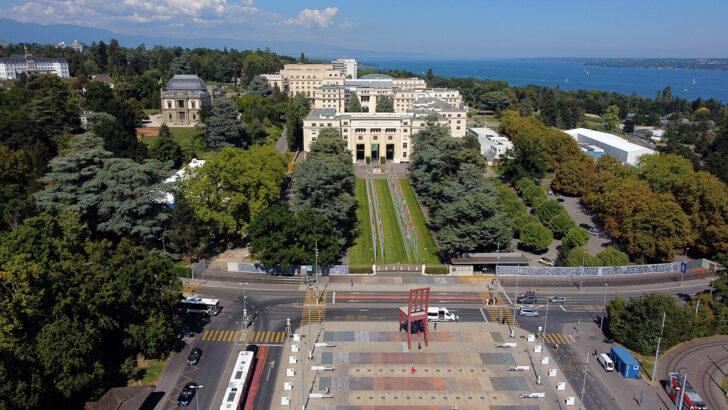Jonathan Luxmoore
As the Universal Declaration of Human Rights is celebrating its 75th birthday, the Vatican’s Permanent Representative in Geneva, Archbishop Ettore Balestrero, organised a symposium that aimed to focus on both human rights and care for creation.
The December 8 symposium, co-sponsored by the Sovereign Order of Malta, Caritas in Veritate Foundation, and the International Catholic Migration Commission, formed part of week-long commemorations of the declaration, signed December 10, 1948, widely seen as a foundational text for modern human and civil rights.
In his introduction, Archbishop Balestrero said the 30-article landmark document, adopted by the UN’s General Assembly, had recognised the “intrinsic dignity of the human person” in the wake of World War II.
Dire
However, he added that the global situation 75 years later looked “undeniably dire” and said the Vatican also believed human beings were “relational in nature,” and existed “not as isolated rights-bearers, but in a web of connections and relationships”.
Meanwhile, Salesian Sr Alessandra Smerilli, the secretary of the Vatican’s Dicastery for Promoting Integral Human Development, said she believed the declaration’s vision of “inherent dignity and inalienable rights” needed urgent revival.
She added that Pope Francis had warned in his most recent apostolic exhortation, Laudate Deum, released on October 4, against a new “technocratic paradigm” of limitless human capacity, in which “goodness and truth automatically flow from technological and economic power”.
“The Pope has appealed for long-term planning, and made concrete proposals for a possible way forward through a prudent and realistic rethinking of multilateralism,” the Italian nun told the symposium.
“Without this, the myth of limitless growth seems set to continue, compounded by a deceptive, false meritocratic logic aimed at disadvantaging the weak and excluded, and holding them responsible primarily for their condition,” Sr Alessandra continued. “The alchemy of these two ideological principles has provided the basis for unscrupulous economic pragmatism and a reckless exploitation of natural resources.”
Sr Alessandra said the Pope had hoped to attend the UN’s COP-28 Climate Change Conference in Dubai, which closed December 12, to encourage “binding international decisions,” adding that she hoped international agencies and organisations would work more effectively in “addressing current challenges together, not in separate silos”.
The Vatican Dicastery for Promoting Integral Human Development, headed by Cardinal Michael Czerny, has made resources and planning guides available to Catholics active against climate change and economic exploitation since the Laudato Si’ encyclical, which focused on the integral relationship between God, humans and the Earth.
Inadequate
In his follow-up Laudate Deum, published at the start of the Synod on Synodality, Pope Francis said he believed the responses had been inadequate, leaving the world “nearing the breaking point,” adding that the world’s “great economic powers” were still concerned “with the greatest profit possible at minimal cost and in the shortest amount of time”.
Addressing the Vatican-run symposium, Amy Pope, the director-general of the UN’s International Organisation for Migration (IOM), commended the Pontiff’s approach to migration at a time of mass population displacements in Gaza, Ukraine, Congo and elsewhere in the face of war, climate change and demographic decline.
She added that the IOM also believed in the “dignity and worth of all people” and the “capacity of humans to do good,” and said “well-managed migration” could create widespread benefits by enabling migrants to send money home while making up labour shortages in developed countries.
Meanwhile, Tatiana Valovaya, director-general of the UN Office in Geneva, said she concurred with Pope Francis that the multilateral system created in the 1940s was “not fit for the 21st Century,” and needed replacing with a more “inclusive multilateralism,” giving a “equal voice” to all states and drawing on expertise from regional organisations and civil society.
Ms Valovaya, who is Russian, said the human rights declaration, celebrated at the event, had marked the first global rights consensus, enshrining “common values transcending borders, cultures and faiths,” and had offered a “contractual foundation for justice, equality and freedom between governments and peoples”.
Paradigm
However, she added that she and other UN officials shared the Pope’s view that a “new paradigm” was now needed, as well as a “renewed multilateralism” to combat “global mistrust and geopolitical tensions”.
In his address, Archbishop Balestrero said many “principles and objectives” of the UN system resonated “with Catholic Church priorities,” especially in its focus on “solidarity and inclusion”.
He added that Geneva provided a “strategic hub” for numerous international organisations, and said he hoped a new multilateralism would enable “ideologies and utilitarian thinking” to be set aside as the UN and its agencies thought and acted more closely in tackling current problems.
Jonathan Luxmoore writes for OSV News from Oxford, England.


 The European headquarters of the United Nations is pictured in Geneva. Photo: CNS/Denis Balibouse, Reuters
The European headquarters of the United Nations is pictured in Geneva. Photo: CNS/Denis Balibouse, Reuters 